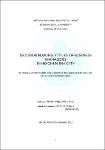| dc.contributor.author | Thinh, Do Tien | |
| dc.date.accessioned | 2013-10-29T04:03:26Z | |
| dc.date.accessioned | 2018-06-12T01:26:48Z | |
| dc.date.available | 2013-10-29T04:03:26Z | |
| dc.date.available | 2018-06-12T01:26:48Z | |
| dc.date.issued | 2012 | |
| dc.identifier.uri | http://10.8.20.7:8080/xmlui/handle/123456789/771 | |
| dc.description.abstract | Decision making is one of the most important managerial functions in the administration of any organization. Managers of the organizations make decisions with different kinds that will affect to these organizations. It is one of many factors which play role in the successes of the organization as well as the successes of decision makers. It is also not many researchers conducting study on business managers in Ho Chi Minh City about this field.
The main purpose of this study is to explore the decision style of business manager in Ho Chi Minh City. A second purpose is to clarify the different among categories of demographic groups in decision making styles. This research also explores the relationship between decision style of manager and the successes of their decision.
The result of this study supports for the understanding of leadership of business managers in Ho Chi Minh City.
The research use Decision Style Model of Rowe and Mason (1987) as a based theory. The survey method was conducted for this study. Questionnaires consist of two parts: The first part is Decision Style Inventory which was developed by Rowe and Mason (1987). This inventory was used to measure the decision styles of business managers
in Ho Chi Minh City. Furthermore, the second part included of nine questions. Six questions are to receive profile data of respondents, while the three remaining questions are to measure the successes of respondents’ decision in their viewpoint.
The finding shows that the dominant style of business managers in Ho Chi Minh City are behavioral, followed by the directive style. The conceptual style was used least
often. The result also found that there is a significant different among the groups of age; job position; education level; and gender in decision styles of managers. However, there is not any statistically significant different among the groups of
number of subordinate, and groups of organization activities. The finding also shows there is the relationship between decision styles and the successes of manager’s
decision. | en_US |
| dc.description.sponsorship | PhD. Phan Trieu Anh | en_US |
| dc.language.iso | en | en_US |
| dc.publisher | International University HCMC, Vietnam | en_US |
| dc.relation.ispartofseries | ;022000978 | |
| dc.subject | Business management | en_US |
| dc.title | Decision making styles of business managers in Ho Chi Minh City | en_US |
| dc.type | Thesis | en_US |


